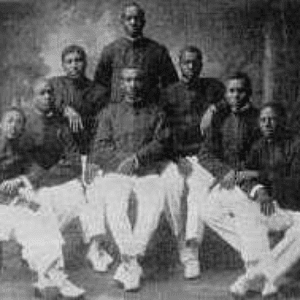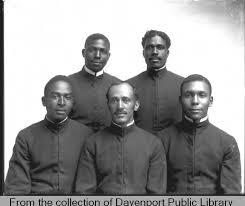Introduction
The Tuskegee Institute Singers were created in 1914 as one of the famous University Jubilee style quartets. The first quartet consisted of students Hiram H. Thweatt, John F. McLeMore, Warren Logan, and Robert H. Hamilton. Hamilton led the group and arranged many of their performance pieces.
Origin of the Genre
Jubilee Quartets rose from Negro Spirituals finally being arranged and performed. They were groups of 4-6 members singing four-part harmonies. The types oF Jubilee Quartets were university quartets, minstrel quartets, community quartets, shape note quartets, and barbershop quartets.
Characteristics of the Genre
A capella: this is a musical style where the performers sing without musical accompaniment. In some instances, the performers use their voices as instruments. A capella focuses on harmonizing and melodies. In the past, it was forced upon African Americans because their instruments were taken away on plantations. It is a sign of resilience because despite not having instruments, we still made music and were able to influence all the rest of the music genres.
Beat/Rhythm: the beat or rhythm were the aspect of the songs that classified them in the Jubilee Quartet genre instead of the Negro Spiritual genre. These systematic arrangements of background sounds usually made the songs a faster tempo, and less melancholy.
Four Harmonies: the four harmonies that make up the Jubilee Quartet Genre are the lead baritone, the bass, first tenor, and second tenor. These parts sing together to create the quartet sound.
In Jubilee Quartets, there was no ad-libbing. It was strictly memorized and arranged performances.
Social Implications
The Jubilee Quartet genre came around after the civil war. After the civil war ended, freed enslaved people had to get used to a new way of life. These Jubilee Quartets brought back the songs of struggle and empowerment from times when African Americans were enslaved, but with a more modern spin to fit the new times.
Commodification
The Fisk Jubilee Singers from Fisk University developed Negro Spirituals into the specific Jubilee Quartet genre. They were the first ones to commodify this type of music, and the Tuskegee Institute Singers followed soon after. They traveled around performing and made money off of their shows, and this helped support their schools. An interesting fact from their performances is that white people enjoyed going to these Jubilee Quartet performances, so they had part in the commodification and assisted in funding the schools through the performances.
Influences on Future Genres
Jubilee Quartets influenced gospel music and gospel quartets. Gospel became a more developed version of the Jubilee Quartet genre.

Conclusory Opinions
The Tuskegee Institute Singers deserve to be written in history as one of the grassroots jubilee quartets. Although they took techniques from the Fisk Jubilee Singers, they ended up developing their own style within the Jubilee Quartet Genre. More of their work can be found at the Library of Congress National Jukebox online site.


